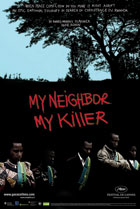
My Neighbor, My Killer 2009
Distributed by Anne Aghion Films, PO Box 1528, New York, NY 10276; 212-254-1360
Produced by Anne Aghion
Directed by Anne Aghion
DVD, color, 80 min.
Jr. High - Adult
African Studies, Holocaust and Genocide Studies, Law
Date Entered: 04/07/2011
Reviewed by Patricia B. McGee, Coordinator of Media Services, Volpe Library & Media Center, Tennessee Technological UniversityFilmed over the course of a decade, My Neighbor, My Killer follows the story of the neighborhood tribunals, Gacaca, established by the Rwandan government to judge crimes committed during the 1994 genocide. The purpose of the courts is to rebuild the county and “replenish our hearts… so that the survivors can forgive and the others seek forgiveness.” The scars of the Rwandan genocide seem impossibly deep; the victims were “killed by their own… killed without pity.” For the survivors it was especially painful to see these killers released from prison and returned to their communities.
My Neighbor, My Killer is told solely in voices of both accusers, by and large women, and accused, primarily men. The accusers’ testimony is replete with small details and their accounts are so horrific, their emotional pain so immense, that one can only marvel at their resilience. While the intention of the Rwandan government in creating the courts was to bring the accused and their accusers face to face for a process of reconciliation, some of the perpetrators were less than eager to acknowledge their actions and repent, and some of the survivors seem at first resigned to their suffering.
This extraordinary film portrays the devastating effects of unspeakable events with grace and sensitivity. The Rwandans speak with dignity and eloquence, and with a depth of feeling. Felicite Nyirasangwa, the grieving mother who asked the court to grant clemency to Vianney Byirabo the killer of her children spoke most eloquently. “No, it’s surely not easy for him to bear the burden of human flesh. But don’t let him ask me to relieve him of that burden. …You wipe your tears right there on the grass and then put on a smile.” This superb film is highly recommended, but the intensity of the emotional content does make it difficult to view.